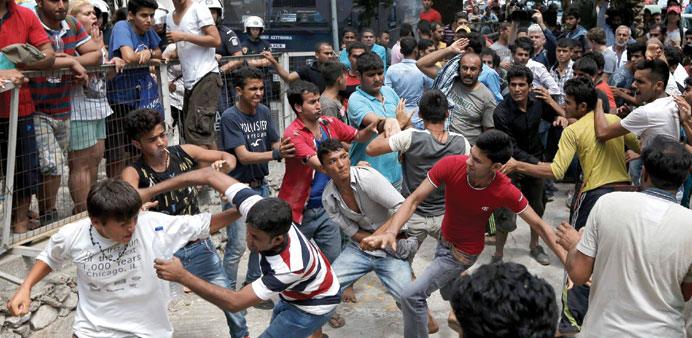Pakistani, Iranian and Afghani migrants scuffling over priority at a registration queue in the Greek city of Kos yesterday. The United Nations refugee agency has called on Greece to take control of the “total chaos” on Mediterranean islands, where thousands of migrants have landed.
The European Union says the scale of migration, driven by war, disaster and poverty, has no parallel since the end of World War II
AFP
Rome
At least 40 migrants died in the hold of a boat off Italy yesterday as the EU struggled to cope with “the worst refugee crisis since World War II”, with thousands making dangerous crossings to reach Italy and Greece.
“Operation under way... many migrants saved. At least 40 dead,” the Italian navy said on Twitter, while the Corriere della Sera newspaper said those who died were found in the hold of the vessel, apparently having suffocated below deck.
An Italian navy helicopter had spotted the boat, which was “overcrowded and starting to sink”, about 21 nautical miles off the Libyan coast, south of the Italian island of Lampedusa, a reporter with Italy RaiNews TV at rescue operation headquarters said.
An Italian navy patrol boat was then sent to its aid and when its sailors boarded the boat, the grim discovery was made.
“We were faced with a very emotional scene,” Commander Massimo Tozzi, told the Italian news agency AGI, describing how some bodies were floating on the water.
The 312 survivors - including 45 women and three children - were transferred to the Norwegian vessel Siem Pilot.
Almost 400 other migrants were picked up in the Mediterranean yesterday by other vessels taking part in the EU’s patrol and rescue operation, Triton.
Survivors of the hazardous crossing from Libya often tell of how traffickers lock migrants in the hold - mostly black Africans - who pay less for the voyage.
Packed inside the confined space they not only risk drowning if the rickety boats capsize, but many are also overcome by diesel fumes.
“This tragedy will not be the last if the international community does not find a solution to the crisis in Libya,” from which most of the migrants set out, Italy’s Interior Minister Angelino Alfano said.
The European Union says the scale of migration, driven by war, disaster and poverty, has no parallel since the end of World War II.
“The world finds itself facing the worst refugee crisis since the Second World War,” EU migration commissioner Dimitris Avramopoulos said on Friday.
Italy and Greece have borne the brunt of the emergency.
On the Greek island of Kos, scores of exhausted migrants, many of whom arrived on inflatable boats early yesterday, were turned away from a ferry that was due to start registering new arrivals.
“We don’t know where to go. We were told we could no longer register at the stadium” where Greek authorities were registering new arrivals this week, said Sleiman, a Syrian refugee among those gathering near the ferry in the morning.
“We are in a vicious cycle, and we keep turning round and round,” he said.
UN refugee agency spokeswoman Stella Nanou said it was unclear whether registration on the ferry would begin later in the day, as authorities had announced on Friday.
Nanou also said the EU must show more “solidarity” with Greece as it struggles to handle the migrant crisis.
“For example, solidarity in terms of financial support to Greece, solidarity in terms of technical support, and solidarity in terms also of creating more legal ways for those people to reach Europe,” she told AFP.
Still, hundreds of people who had registered could be seen leaving the Greek resort island yesterday on a ferry to Athens.
But after the precarious boat trip to Kos and sleeping rough on the streets, a young Syrian man, Anas, who is travelling to Athens with his daughter, feared more hardship was to come.
“We managed to escape drowning but now we don’t know what is going to happen. We came to Europe but honestly, it’s all fear, it’s all danger and nothing is working,” said Anas, who declined to give his second name.
A couple of days ago, there were some 7,000 refugees and migrants on Kos, but that number has fallen to some 2,500, according to Greek police.

